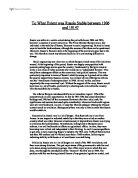Yet there was no widespread passive disobedience but scattered violence. This highlighted the weakness of the opposition and allowed the tsar to assert his power and arrest and bar the deputies from re-election. The Liberal cause discredited itself, meaning the tsar came out of the incident stronger than before.
The tsarist regime strengthened its position by weakening that of the opposition. By doctoring the electoral system, the 3rd Duma in 1907 had more deputies from moderate parties. This meant the tsar would have a more cooperative Duma which allowed him to secure his power.
Stolypin was appointed President of Council of Ministers in July 1906 and like Witte, was dedicated to strengthening tsardom. He believed in suppression first then reform. Yet reform should only be done to reduce social bitterness. This policy was based on trying to weaken any potential opponents so went some way to ensure the survival of the tsarist regime.
Another factor which helped the tsar retain his position was Stolypin’s aim to de-revolutionise the Peasantry. He recognised that the high price of land and heavy mortgages impoverished peasants, making them insecure and a dangerous social force. So the government so bought off peasants by cancelling repayments. This deprived the revolutionaries of mass peasant support thus cementing tsarist power.
The creation of Kulaks, rich peasants, also weakened the opposition. The Land Bank was established to provide funds for the independent peasant to buy their land. This aimed to create a layer of prosperous peasants that would block forces of revolution. It partly succeeded. This social transformation drained the strength out of the revolutionary support, helping to maintain tsarism.
Although the opposition was weak, Stolypin’s policy of repression also helped the tsarist regime survive. Martial law was proclaimed and military courts were used to quell disturbances. Between 1906 and 1911, there were over 2500 executions and the hangman’s noose became known as “Stolypin’s necktie.” This illustrates how the tsar was firmly in control and that it was not just the weaknesses of his opponents that meant the tsarist regime survived for so long.
The survival of the tsar’s regime was also helped by the partial economic recovery caused by the end of the war with Japan and the Tsar’s reforms. Opposition groups saw their popularity decrease as the circumstances in Russia slowly improved. Therefore, it was not only the weakness of the tsarist regime’s opponents that meant it retained its power, but also improvements in the conditions.
The end of the war with Japan in 1905 had benefitted Nicholas II as by 1906, it allowed him to bring back troops to put down the revolution at home. These loyal troops meant Nicholas II remained in control. He never lost the support of either the army or the aristocracy and these were crucial in helping him survive.
Furthermore, the Tsar was able to use the Secret police, Okhrana, to repress opposition. They were a ruthless well organised force, meaning opponents were weakened. Because this weakened the opposition, it helped the tsar immensely in retaining his power.
The opposition was weak. Despite the unrest of 1905, the revolutionaries couldn’t capitalise on the discontent. Also, the peasantry hadn’t mobilised en masse, making it hard for a coherent opposition to form before 1914. Therefore the tsar was able to remain in power up for some time.
What undermined the tsar’s opposition, yet strengthened his own position was the fact that it was made up of mainly contradictory groups. Part of the problem was that there was no effective leadership which was desperately needed with so many different groups, all wanting different things. Therefore from 1906 to 1914, there were no opposition group with the potential to harness the unrest, enabling the tsar to retain his control.
Some consider the Tsar’s officials as most important in making sure he remained in power. Both Witte (focused on industrial development) and Stolypin (introduced Land Reforms) tried to reform programmes to protect the tsarist regime. He also relied on their inks with the military for him to remain in power. Yet neither was appreciated by the tsar despite the fact that, without them, tsarism would have been more likely to fail. The weakness of the opposition wasn’t the only factor that enabled the tsar to secure power.
Initially, the outbreak of WW1 in 1914 actually benefitted the tsarist regime. Firstly, the Duma showed its support for the tsar by calling for its own suspension during the war, illustrating how the Duma was like putty in the tsar’s hands. Another reason being, that the Bolsheviks were vilified as traitors for being anti-war so many, Lenin included, were forced to leave the country. Thus weakening their influence within Russia and allowing the tsarist regime to survive.
The key to the tsar’s survival was his clever use of tactics. In the heat of the crisis he granted political and economic concessions in order to appease opponents. Then once he had regained control he began to suppress the opposition once more. This is primarily seen by the publication of the Fundamental Laws of 1906 and the use of the Okhrana. Lulling the opposing parties into a false sense of security weakened them. This helped the tsarist regime survive.








